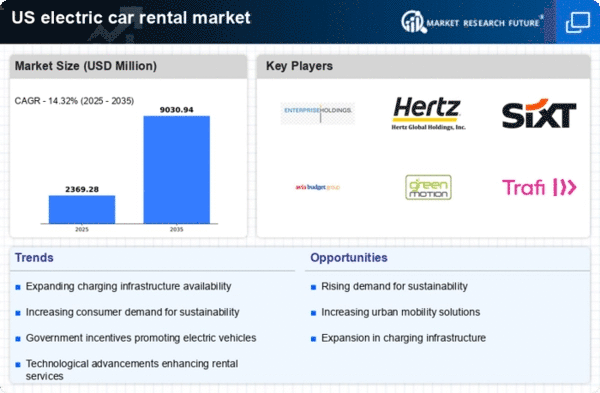Growing Environmental Awareness
the electric car-rental market is seeing a surge in demand due to increasing environmental consciousness among consumers. As awareness of climate change and air pollution rises, individuals are more inclined to choose eco-friendly transportation options. This shift is reflected in a 2025 survey indicating that approximately 70% of respondents prioritize sustainability when selecting rental vehicles. Consequently, rental companies are adapting their fleets to include a higher proportion of electric vehicles, aligning with consumer preferences. This trend not only enhances the appeal of the electric car-rental market but also positions it as a key player in the broader movement towards sustainable travel. As more consumers seek to minimize their carbon footprints, the electric car-rental market will likely continue to grow, driven by this heightened environmental awareness.
Technological Advancements in EVs
The electric car-rental market is benefiting from rapid technological advancements in electric vehicles (EVs). Innovations in battery technology, such as increased energy density and faster charging capabilities, are making electric cars more practical for rental purposes. For example, the latest EV models can achieve a range of over 300 miles on a single charge, addressing range anxiety among potential renters. Furthermore, advancements in autonomous driving technology may also influence the market, as rental companies explore the integration of self-driving electric vehicles into their fleets. As these technologies continue to evolve, they are likely to enhance the appeal of the electric car-rental market, attracting a broader customer base and potentially increasing rental durations and frequency.
Government Incentives and Policies
Government initiatives play a crucial role in shaping the electric car-rental market. Various federal and state programs offer incentives for both consumers and rental companies to adopt electric vehicles. For instance, tax credits and rebates for electric vehicle purchases can significantly reduce costs for rental companies, encouraging them to expand their electric fleets. Additionally, policies aimed at reducing greenhouse gas emissions are prompting cities to invest in electric vehicle infrastructure, such as charging stations. As of 2025, over 30 states have implemented policies that support electric vehicle adoption, which is expected to further stimulate the electric car-rental market. These incentives not only make electric vehicles more accessible but also enhance the overall attractiveness of the market, potentially leading to increased rental rates and customer satisfaction.
Rising Fuel Prices and Economic Factors
Economic factors, particularly rising fuel prices, are influencing consumer behavior in the electric car-rental market. As fuel costs continue to escalate, consumers are increasingly seeking cost-effective alternatives for transportation. Electric vehicles, which typically have lower operating costs compared to gasoline-powered cars, present an attractive option for renters looking to save money. In 2025, the average cost of gasoline is projected to reach $4.00 per gallon, prompting more individuals to consider electric rentals as a financially viable choice. This economic shift is likely to drive demand for electric vehicles in the rental market, as consumers become more price-sensitive. Consequently, rental companies may experience increased interest in their electric offerings, further solidifying the electric car-rental market's position in the transportation landscape.
Urbanization and Changing Mobility Trends
The ongoing trend of urbanization is reshaping transportation needs and preferences, thereby impacting the electric car-rental market. As more people move to urban areas, the demand for convenient and flexible transportation options is increasing. Electric car rentals offer a viable solution for urban dwellers who may not own vehicles but require access to transportation for short trips. In 2025, urban areas are projected to account for over 60% of rental transactions, highlighting the importance of adapting to changing mobility trends. Additionally, the rise of shared mobility services is encouraging consumers to consider electric rentals as a sustainable alternative to traditional car ownership. This shift in urban mobility patterns is likely to drive growth in the electric car-rental market, as companies respond to the evolving needs of city residents.
















